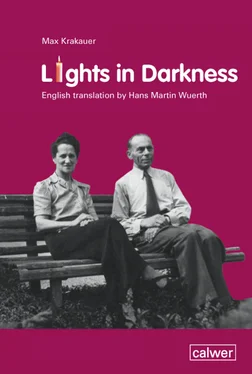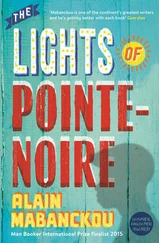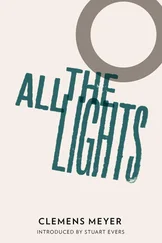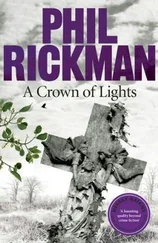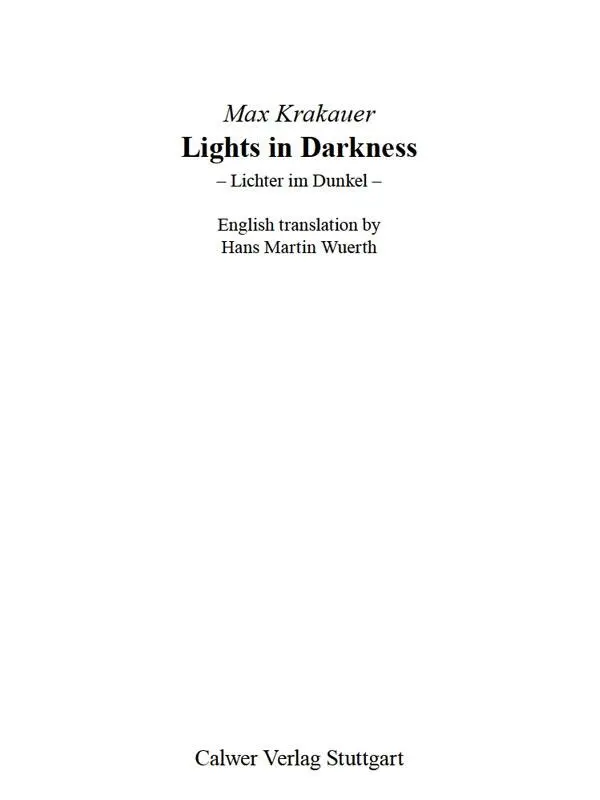
Publication by Calwer Verlag, Stuttgart/Germany
Title in the original German version:
Lichter im Dunkel – Flucht und Rettung eines jüdischen Ehepaares im Dritten Reich 1947 by Behrendt-Verlag, Stuttgart/Germany Copyright: 2007 by Calwer Verlag, Stuttgart/Germany
First English version:
Lights in Darkness (English translation by Hans Martin Wuerth) Copyright: 2012 by Calwer Verlag, Stuttgart/Germany
Maps: diGraph, Atelier für didaktische Grafik GmbH, Lahr/Germany
eBook (epub): ISBN 978-3-7668-4232-9
eBook (pdf ): ISBN 978-3-7668-4241-1
Print edition in German: ISBN 978-3-7668-4001-1
www.calwer.com
eBook-Herstellung und Auslieferung:
Brockhaus Commission, Kornwestheim
www.brocom.de
In memory of my in-laws, the Righteous Gentiles
Otto and Gertrud Mörike.
Preface
Dark skies overhead
The gutter overflows
Forced labour
Asylum overnight
Pomeranian journey
Panic
Salto mortale
Arrest
Brethren’s council
Christmas and winter
On swabian roads
The race against time
They are coming
Conclusion
Epilogue
Brief biography
Since the end of World War II, Holocaust-related books and articles, in the form of fiction and non-fiction, have appeared in large numbers. The authors, among them Holocaust survivors, told and retold the anti-Jewish racist policies of the National Socialst regime, which resulted in the identification, discrimination, persecution, deportation, and extermination of Europeans Jews. Among the many autobiographical narratives, is the memoir of Max Krakauer who, soon after the war had ended in 1945, wrote the story about his and his wife’s years of living in hiding. This small book, with the symbolic German title, Lichter im Dunkel , was published in 1947 and was one of the first autobiographical accounts by a German Jew who, with his wife Karoline (Ines), had managed to escape detection and capture inside Nazi Germany between January 29, 1943 and their liberation 27 months later, on April 23, 1945. Despite the abundance of other autobiographical works, Max Krakauer’s book, now available in translation, may be of interest to many English readers.
Lights in Darkness describes an extraordinary, perhaps even unique survival story. Immediately after they had been warned by a neighbor of their imminent arrest, this Jewish couple was constantly on the run for more than two years, without once enjoying a lengthier stay of a month or longer at the home of a rescuer. It is truly astonishing that, as they fled from one shelter to another, covering many hundreds of miles, they were temporarily sheltered in 66 homes in northern and southern Germany. Moreover, yet another surprising aspect was that the majority of their rescuers were Protestant pastors, their wives and other family members.
How, where, and with what difficulties and hardships was this possible? Krakauer provides detailed and objective answers to these and other questions. But above all, his memoir is a very personal and intuitive recollection of how, where, and why he and his wife were able to endure the trauma of being pursued relentlessly by Nazi government officials, and to stay alive in a climate of anti-Semitism, segregation, hatred, persecution, war, and genocide.
How many Jews lived in Germany between 1933 and 1945? Exact numbers are hard to obtain, but there seems to be agreement on the following estimates. When the National Socialists gained power in January of 1933, the Jewish population numbered approximately 500,000, less than 1% of Germany’s population of 75 million. 160,564 of them resided in Berlin. Once Germany’s vitriolic and diabolical policy of anti-Semitism had restricted, then removed the freedom and equal rights of its Jewish citizens, emigration became the only option. German Jews left their previously beloved homeland in large numbers, and some 275,000 did so between 1933 and October 1941. In early 1943, only 20, 000 Jews still lived in Germany under harsh and unforgiving conditions. Of those in hiding, approximately 3,000 to 5,000 survived. The Krakauers’survival was due to their perseverance, the remarkable assistance by their Christian helpers, and, as Krakauer never failed to add, God’s protection.
Lights in Darkness describes Max Krakauer’s futile attempts to emigrate from Nazi Germany following the confiscation of his lucrative business, a film rental agency in Leipzig. In January, 1939 the Krakauers daughter, Inge, left Germany for safety in England, and he and his wife, soon after they arrived in Berlin, were subjected to hard and dehumanizing forced labor (“Zwangsarbeit’). This continued until both went underground in January,1943, having taken this drastic, life-saving measure at the last possible moment, literally only a few steps ahead of the Gestapo. At this exact point in time began their perilous and prolonged odyssey. Illegally travelling on foot and relying on public transportation that was regularly controlled by police, and carrying falsified identify papers (they had assumed the name of “Hans and Grete Ackermann” until their liberation), they had only little money and limited food rations, and initially stayed at seven places in Berlin. Subsequently, they were advised by members of the Confessing Church to take a precarious but necessary train ride to Pomerania, east of the Oder River.
There they found shelter in fifteen different homes, but were almost identified as Jews. Five months later, when no additional rescuers in Pomerania were prepared or willing to accept them, they made their second daunting train ride by returning to Berlin. In Berlin, due to the absence of more places to hide (they had located only two), they were persuaded to take their longest train yet, this one to the southern State of Württemberg and its capital, Stuttgart. From August of that year to their liberation 20 months later, they crisscrossed Württemberg, often on foot and regardless of weather conditions. However, their decision to relocate in the south proved to be a lifesaver. The Krakauers who had lived in Leipzig and Berlin before, gradually had become familiar with their southern environment, and once their liberation had become a reality, they remained in this State to the end of their lives. (The enclosed maps and dates of the Northern and Southern Escape Routes are most helpful in retracing their prolonged journey.)
Of course, the overriding concerns throughout their escape were the following. First and foremost, would they not be confronted and seized by German officials, whose sudden appearance could happen anywhere and at any time? “Each train stop became a test of nerves, and each male passenger who got on plunged us into fear and terror because each passenger could have been a Gestapo agent.” Secondly, were there enough trustworthy and compassionate persons or families who would take them in, provide them with food and shelter, and for how long? Finally, would they have the strength, will, and resilience to go on? Indeed, on several ominous occasions they saw no sense in pressing on and favoured turning themelves in. “We were overcome by an anxiety that began to incapacitate us. Again we faced the question: Did our action make any sense whatsoever? Was it worthwhile taking on more hardships and facing new calamities?”
As we can read in this dramatic memoir, the Krakauers struggled against anguish and fear and faced recurrent obstacles, setbacks, and near arrests. But somehow they always overcame their moments of disillusionment and regained renewed hope in staying alive and in being reunited with their daughter Inge as soon as the war was over. The frequent and heavy bombing raids, insufficient food supplies, lack of housing, gradual breakdowns of the transportation system, lack of coal and wood for heating homes etc. signalled the impending defeat and surrender of Hitler’s regime. They felt that their liberation would only be a matter of time. But until this happened, their survival depended mostly on the protection, guidance, support, and encouragement of more than one hundred different rescuers, the “lights in the darkness.”
Читать дальше
